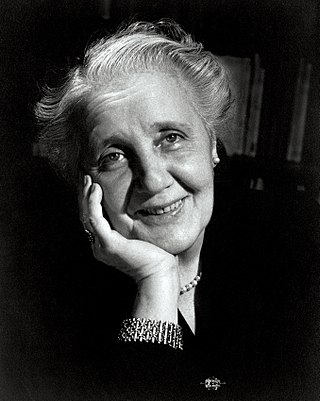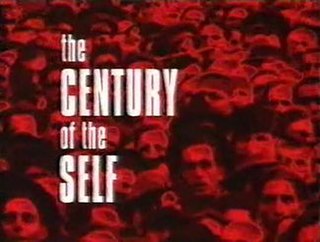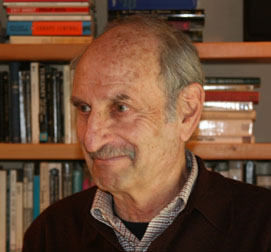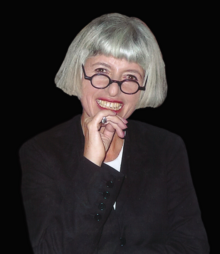
Sigmund Freud was an Austrian neurologist and the founder of psychoanalysis, a clinical method for evaluating and treating pathologies seen as originating from conflicts in the psyche, through dialogue between patient and psychoanalyst, and the distinctive theory of mind and human agency derived from it.
Psychoanalytic theory is the theory of personality organization and the dynamics of personality development relating to the practice of psychoanalysis, a clinical method for treating psychopathology. First laid out by Sigmund Freud in the late 19th century, psychoanalytic theory has undergone many refinements since his work. The psychoanalytic theory came to full prominence in the last third of the twentieth century as part of the flow of critical discourse regarding psychological treatments after the 1960s, long after Freud's death in 1939. Freud had ceased his analysis of the brain and his physiological studies and shifted his focus to the study of the psyche, and on treatment using free association and the phenomena of transference. His study emphasized the recognition of childhood events that could influence the mental functioning of adults. His examination of the genetic and then the developmental aspects gave the psychoanalytic theory its characteristics. Starting with his publication of The Interpretation of Dreams in 1899, his theories began to gain prominence.

Melanie Klein was an Austrian-British author and psychoanalyst known for her work in child analysis. She was the primary figure in the development of object relations theory. Klein suggested that pre-verbal existential anxiety in infancy catalyzed the formation of the unconscious, which resulted in the unconscious splitting of the world into good and bad idealizations. In her theory, how the child resolves that split depends on the constitution of the child and the character of nurturing the child experiences. The quality of resolution can inform the presence, absence, and/or type of distresses a person experiences later in life.
In Freudian Ego psychology, psychosexual development is a central element of the psychoanalytic sexual drive theory. Freud believed that personality developed through a series of childhood stages in which pleasure seeking energies from the child became focused on certain erogenous areas. An erogenous zone is characterized as an area of the body that is particularly sensitive to stimulation. The five psychosexual stages are the oral, the anal, the phallic, the latent, and the genital. The erogenous zone associated with each stage serves as a source of pleasure. Being unsatisfied at any particular stage can result in fixation. On the other hand, being satisfied can result in a healthy personality. Sigmund Freud proposed that if the child experienced frustration at any of the psychosexual developmental stages, they would experience anxiety that would persist into adulthood as a neurosis, a functional mental disorder.

Peace and conflict studies or conflict analysis and resolution is a social science field that identifies and analyzes violent and nonviolent behaviors as well as the structural mechanisms attending conflicts, with a view towards understanding those processes which lead to a more desirable human condition. A variation on this, peace studies (irenology), is an interdisciplinary effort aiming at the prevention, de-escalation, and solution of conflicts by peaceful means, thereby seeking "victory" for all parties involved in the conflict.

The Century of the Self is a 2002 British television documentary series by filmmaker Adam Curtis. It focuses on the work of psychoanalysts Sigmund Freud and Anna Freud, and PR consultant Edward Bernays. In episode one, Curtis says, "This series is about how those in power have used Freud's theories to try and control the dangerous crowd in an age of mass democracy."
Charles Thomas William Curle, better known as Adam Curle, was a British academic, known for his work in social psychology, pedagogy, development studies and peace studies. After holding posts at the University of Oxford, University of Exeter, University of Ghana and Harvard University, in 1973 he became the inaugural Professor of Peace Studies at the University of Bradford, following the establishment of the University's Department of Peace Studies. Curle's works included several books on education, including Educational Strategy for Developing Societies (1963), and a number of books on peace and peacemaking, including Making Peace (1971). He was also, throughout his career and after his retirement in 1978, active in peacemaking and mediation, and visited Nigeria and Biafra several times as part of a Quaker contingent during the Nigerian Civil War of 1967–70.
Peace Direct is a charity based in London, England, which supports grassroots peacebuilders in areas of conflict. Peace Direct focuses on supporting grassroots peacebuilders who are local to the conflict and have a clear vision of what needs to be achieved. Peace Direct funds this work, promotes it and learns from it. The current CEO of Peace Direct is Dylan Mathews.
Priscilla "Scilla" Elworthy is a peace builder, and the founder of the Oxford Research Group, a non-governmental organisation she set up in 1982 to develop effective dialogue between nuclear weapons policy-makers worldwide and their critics, for which she was nominated three times for the Nobel Peace Prize. She served as its executive director from 1982 until 2003, when she left that role to set up Peace Direct, a charity supporting local peace-builders in conflict areas. In 2003 she was awarded the Niwano Peace Prize. From 2005 she was adviser to Peter Gabriel, Desmond Tutu and Richard Branson in setting up The Elders. She is a member of the World Future Council and in 2012 co-founded Rising Women Rising World, a community of women on all continents who take responsibility for building a world that works for all.
Oxford Research Group (ORG) was a London-based charity and think tank in Cambridge Heath, working on peace, security and justice issues. Its research and dialogue activities were mainly focused on the Middle East, North and West Africa, as well as influencing UK and international security policy.
In psychoanalysis, the narcissism of small differences is the idea that the more a relationship or community shares commonalities, the more likely the people in it are to engage in interpersonal feuds and mutual ridicule because of hypersensitivity to minor differences perceived in each other. The term was coined by Sigmund Freud in 1917, based on the earlier work of English anthropologist Ernest Crawley. Crawley theorized that each individual is separated from others by a taboo of personal isolation, which is effectively a narcissism of minor differences.

In neo-Freudian psychology, the Electra complex, as proposed by Swiss psychiatrist and psychoanalyst Carl Jung in his Theory of Psychoanalysis, is a girl's psychosexual competition with her mother for possession of her father. In the course of her psychosexual development, the complex is the girl's phallic stage; a boy's analogous experience is the Oedipus complex. The Electra complex occurs in the third—phallic stage —of five psychosexual development stages: the oral, the anal, the phallic, the latent, and the genital—in which the source of libido pleasure is in a different erogenous zone of the infant's body.
The Gandhi Foundation is a United Kingdom-based voluntary organisation which seeks to further the work of Mahatma Gandhi through a variety of educational events and activities.

Louis Breger was an American psychologist, psychotherapist and scholar. He was Emeritus Professor of Psychoanalytic Studies at the California Institute of Technology

Daniel Bar-Tal is an Israeli academic, author and professor of social-political psychology from the Department of Education at Tel Aviv University. He is also the head of The Walter-Lebach institute for jewish-arab coexistence. His research deals with the study of conflicts and their resolution, especially in the Israeli-Arab context.

Sanam Naraghi Anderlini, MBE is a British-Iranian author and Founder and Executive Director of the International Civil Society Action Network (ICAN). She has been a peace strategist working on conflicts, crises and violent extremism and as a consultant to the United Nations on the subject of women and conflict. Naraghi Anderlini joined LSE as Director of the Centre for Women, Peace and Security in December 2019.

WORLD WOMAN is a festival of art and activism in Oslo founded in 2015 by filmmaker and activist Deeyah Khan. The festival highlights the voices of artists and activists from around the world and promotes courage, creativity and compassion through human rights, freedom of expression, equality and peace. The event was produced by Fuuse and it took place on the 30th and 31 January 2015 in the Riksscenen with the support of Norway's Ministry of Foreign Affairs. WORLD WOMAN is planned as an annual event.

Barbara Dockar Drysdale or Barbara Estelle Gordon was a British psychotherapist who started the Mulberry Bush School for troubled children after the Second World War.
Giandomenico Picco, also known as Gianni Picco, was an Italian diplomat and United Nations Assistant Secretary-General for Political Affairs, who negotiated the release of 11 hostages held by terrorists in Lebanon, earning him the epithets "chief troubleshooter" and "unarmed soldier of diplomacy" from United Nations Secretary-General Javier Pérez de Cuéllar.
Mary Target, now Mary Hepworth, is a British psychoanalyst, psychotherapist and clinical psychologist. She works as a university lecturer and psychoanalytic psychotherapist in private practice. She has been the chair of several committees at University College London, the British Psycho-Analytical Society, the British Psychological Society and the International Psychoanalytic Association.










